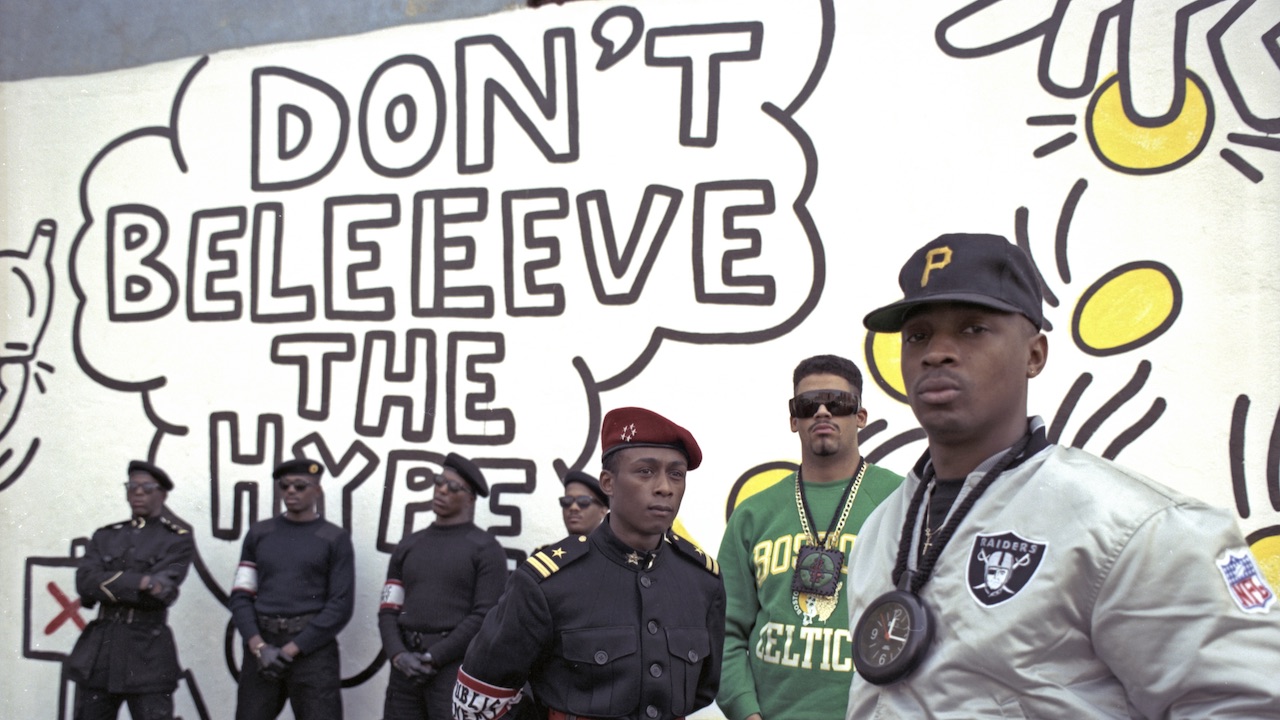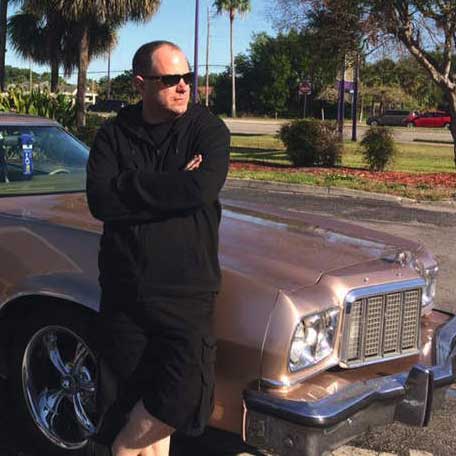Radical, revolutionary and responsible for changing the face of hip-hop forever, Public Enemy formed in Long Island, New York in 1985, around the core of frontman Chuck D (Carlton Ridenhour), iconic clock-wearing hype man Flavor Flav (William Drayton Jr.), and Minister of Information, Professor Griff (Richard Griffin), joined by DJ Terminator X (who later left the music business to start an ostrich farm, and was replaced by DJ Lord).
Alongside Run-DMC and Ice-T, PE were one of the first hip-hop groups to attract rock fans, even prior to Chuck D working with Anthrax on their 1991 cover of Bring the Noise on which he argued for rap to be acknowledged alongside rock as a legitimate music style. During the 1990s, Public Enemy toured with Anthrax, U2 and The Sisters of Mercy, while battling a reactionary and intransigent industry who refused to take the group – and indeed the genre – seriously because of its lack of 'traditional' instrumentation.
Film director Spike Lee once described Chuck D as "one of the most politically and socially conscious artists of any generation." The rapper himself famously described hip-hop as the black community’s CNN, and within lyrical themes advocating for black consciousness, he namechecks, quotes, and samples numerous militant black power activists, as well as politicians and peers. "Public Enemy made hip-hop that was more than entertainment," Beastie Boys' Adam Yauch once noted. "They inspired a lot of people who believed that you can effect change through music."
The upbringing of Chuck D, Flav and Griff – along with assorted PE producers and aides – in Roosevelt, Long Island was crucial to the group’s direction. A neighbourhood with a predominantly black population since the late 1960s, the district was supported by community programs initiated by the Black Panther Party for Self-Defense during the group members’ youth. Public Enemy's own politics were bolstered by an equally radical image, specifically the presence of their bespoke security team, the S1Ws (Security of the First World). Led by ex-US Army soldier and Nation of Islam follower, Professor Griff, the S1Ws dressed in military fatigues, performed choreographed drills on stage, and were armed – at least early in the group’s career – with replica Uzi sub machine guns.
But what separated PE musically from their influences – Whodini, Run-DMC, Eric B and Rakim, Schoolly D – was The Bomb Squad, the cutting-edge hip-hop production crew featuring brothers Hank and Keith Shocklee, Bill Stephney, Eric “Vietnam” Sadler, and Gary G-Wiz. Early PE albums were as ground-breaking and influential for their astonishingly powerful sonics – and extensive sampling from The Bomb Squad’s literal warehouse of vinyl – as much as Chuck D's incisive, articulate, hard-hitting rapping perfectly contrasting the hype of comical foil, Flavor Flav, a vocal partnership originally partly influenced by the call-and-response style of James Brown and Bobby Byrd, best demonstrated on Get Up (I Feel Like Being A) Sex Machine.
Across their storied career, Public Enemy have issued 14 studio albums, plus Rebirth of a Nation, a 2006 collaboration with Paris, their soundtrack to Spike Lee's 1998 movie He Got Game and 2020’s Flav-free Loud Is Not Enough – released under the name Enemy Radio – with rapper Jahi.
They remain a force to be reckoned with.

14. Revolverlution (2002)
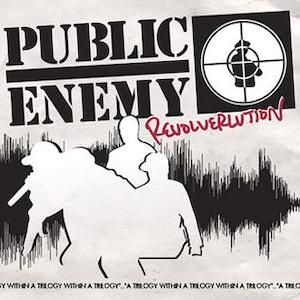
Inspired by the advent of digital music and the evolution of music consumption, Revolverlution is something of a curate’s egg, as it features new tracks alongside live cuts (Miuzi Weighs a Ton, Fight the Power, Welcome to the Terrordome), online UGC-remixes of older material (a fully grimed-up By the Time I Get to Arizona, a trip-hop inspired Shut ’Em Down and a pumped-up D&B style Public Enemy #1), plus soundbites and interviews.
New tracks include Son of a Bush, a broadside at George W, Get Your Shit Together, a reflection on the post 9/11 landscape, and opener Gotta Give the Peeps What They Need, a funk-heavy banger.
Exactly who this uneven, scattershot collection is targeted at is unclear, but it's far from essential.
13. Nothing Is Quick In The Desert (2017)
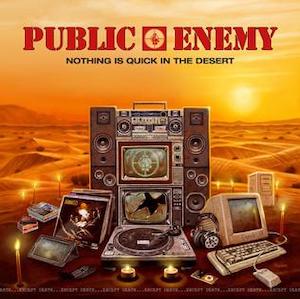
Like its 2015 predecessor Man Plans God Laughs, Nothing Is Quick in the Desert further develops Chuck D’s exasperation and frustration at the corporate music industry’s lack of agility, and its dedication to built-in obsolescence. As Harry Allen’s Interactive Superhighway Phone Call on 1994’s Muse Sick... demonstrated, PE were way ahead of their time and Chuck was an early adopter of digital tech and online platforms. Around the turn of the century when the record industry was losing its collective mind over the advent of MP3s, he stated on his website, “I’m glad to be a contributor to the bomb.”
Nothing Is Quick in the Desert documents the frontman’s anger at the industry’s glacial evolution and its refusal to adapt and futureproof, along with the outmoded dissemination of media in general. Circumventing the whole mess, the album was released as a free download. Ice-T guests on highlight Smash The Crowd, So Be It is classic driving PE, and Rest in Beats is a touching tribute to the rap’s community’s fallen heroes, as well as a lament for the loss of infrastructure and support network that originally elevated rap.
"After 30 years, 106 tours across 105 countries and countless records, THANK YOU!" the band stated as the album dropped. "This one is on Public Enemy."
12. The Evil Empire of Everything (2012)
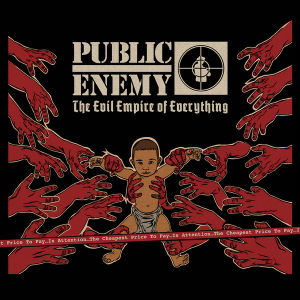
Released just three months after Most of My Heroes... and intended as a companion set, the band's twelfth album, The Evil Empire... saw the return of controversial founding member Professor Griff, taking up production duties alongside long-serving PE collaborators Gary G-Wiz, Johnny Juice and C-Doc.
Don’t Give Up The Fight is a pastoral reworking of Bob Marley’s Get Up, Stand Up features Ziggy Marley, while Henry Rollins lends his trademark shouty vocals to Riotstarted, which also featuring RATM’s Tom Morello on guitar. The guests lend the album a diversity of styles, but The Evil Empire... lacks a single unifying cohesive vision.
11. New Whirl Odor (2005)
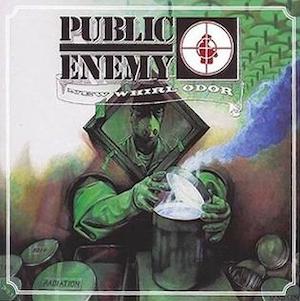
Ambient electronica superstar Moby is the one of the last people you might expect as a PE collaborator, but this unlikely union strikes gold on MKLVFKWR (Make Love, Fuck War), the highlight of the band's ninth studio album: typically topical and perceptive, Chuck D spits, "Making new slaves out of immigrants/Wanna know where the money went."
Notable too are the erratic What A Fool Believes, a rock hybrid that reclaims PE’s influence on nu-metal, albeit with a kinda messy structure, and the daringly eclectic jazz-inspired and progressive Superman’s Black in the Building, which demonstrates that the Long Island crew retain an appetite for breaking new ground.
Buy from Amazon
10. Man Plans God Laughs (2015)
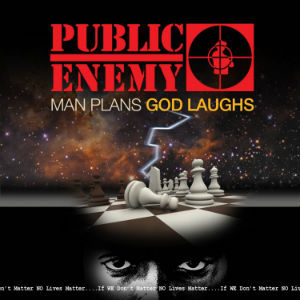
Featuring guest turntablism from old comrade Terminator X. Man Plans God Laughs takes aim at the monolithic corporate structure of the music industry from the bleak No Sympathy from the Devil to the driving title track with its repetitive “Am I a radical?” refrain, where, foretelling the advent of so-called 'cancel culture', Chuck D considers the idea of asking questions without being criticised.
Veering away from the central theme, Honky Talk Rules, featuring the awesome Sheila Brody on guest vocals, satirically reworks the Stones’ Honky Tonk Women and takes aim at the crimes and enduring impact of western – specifically British – colonialism.
Sombre, brooding, and downbeat throughout, Man Plans God Laughs is full of existential thoughts and ideas.
9. Most Of My Heroes Still Don't Appear On No Stamp (2012)
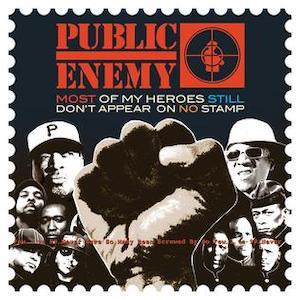
With its title riffing on the classic Chuck D lyric first coined on Fight the Power, Most of My Heroes... may be self-referential. but it also emphasises how little changed in the intervening 24 years in terms of how [white] America chose to document its history.
The title sets the tone for the album: serious, solid and forward-thinking, in stark contrast to the reflective nostalgia of its predecessor, 2007's How You Sell Soul... Most of My Heroes... spits fire on the menacing title track, a high point alongside the ultra-cool I Shall Not Be Moved, and the old-school inspired RLTK, featuring guest rapper DMC. Featuring extensive use of an instrumental backing band, PE were still pushing the envelope of rap here.
8. What You Gonna Do When The Grid Goes Down? (2020)
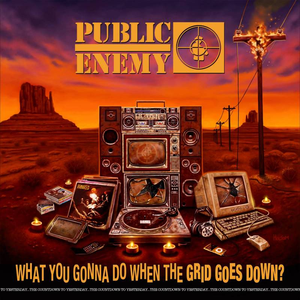
The excitement of seeing PE back on Def Jam for the first time since the '90s is only surpassed here by the impressive ensemble cast of guest stars celebrating their return, not least iconic funk pioneer George Clinton.
The Parliament-Funkadelic legend steers the opening title track and GRID, both sci-fi psyche PE-stylised funk, with the latter tune also blessed with a cameo from Cypress Hill, reworking rhymes from their own 1993 single When the Ship/Shit Goes Down.
There's further nostalgia in a reworking of Public Enemy #1 as Public Enemy Number Won, featuring Run-DMC and Beastie Boys Ad-Rock and Mike D, and a celebratory update of Fight the Power boasting support from Nas, Rapsody, Black Thought, Jahi, YG and Questlove. Elsewhere, the album recycles tracks originally included on free download Nothing Is Quick in the Desert, along with its cover artwork.
The album isn't all about toasting the return of the kings and hailing glory days gone by, however, with lead-off single State of the Nation (STFU) – a blistering assault on Trump – serving emphatic proof that PE are still as uncompromising as ever.
7. There's A Poison Goin' On (1999)
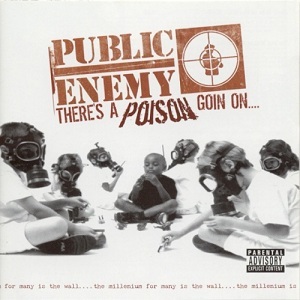
The emergence of PE album seven was nicely timed on the eve of the new millennium, and the group took full advantage of Y2K conspiracy fears with a brilliantly executed metaphorical sleeve cover image.
Although not a big seller in the US, There’s a Poison Goin’ On was comparatively well received in the UK following the group’s five year absence (discounting the He Got Game soundtrack) since Muse Sick-n-Hour Mess Age.
Tonally, the album is tense, sinister, and as uncompromising as ever. One of Flav’s greatest works, the chilling 41:19 references the extrajudicial killing of 23-year-old Guinean student, Amadou Diallo. The NYPD claimed to have mistaken Diallo for a rape suspect and when attempting arrest, officers discharged 41 rounds, with just 19 shots entering Diallo. What appeared to be an indiscriminate shooting led to accusations of racial profiling and police brutality, and here, citing police harassment and violence, Flav mocks the glorification of the 'boys in blue' on US reality TV show COPS, and later namechecks renowned civil rights activist Al Sharpton who led a protest following the Diallo killing.
After the album's release, Chuck D vehemently denied accusations of lyrical anti-Semitic tropes following the Anti-Defamation League’s criticism of the brutal Swindler’s Lust, a track intended as a critique of the music industry in relation to unfair payments to black artists.
6. How You Sell Soul To A Soulless People Who Sold Their Soul??? (2007)
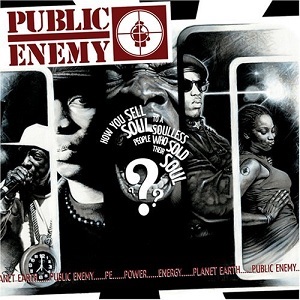
PE’s 20th anniversary album was a storming return to form. It's a blast from the outset, with the opening title track’s chunky funk followed by the old-school Run-DMC style flow of the riff-heavy Black is Back, which in turn segues perfectly into Flav’s throwback to Public Enemy #1 at the top of Harder Than You Think, a touching reflection on PE’s career. An inspired choice as the soundtrack to Channel 4’s 2012 Paralympics coverage, it introduced the group to a to a whole new generation, and has since become PE’s most streamed track.
Moving on, KRS-One guests on Sex, Drugs & Violence which satirises music industry dead cat strategy nonsense, while the sombre and chilling American Gangster is a knockout punch. And that’s just the first third of the album.
Throughout, How You Sell Soul... is muscular, wise, reflective, funky, urgent and humorous (shout out to The Long and Whining Road) with a fantastic clarity of production thanks to The G-Wiz.
PE were back with a bullet.
5. Muse Sick-n-Hour Mess Age (1994)
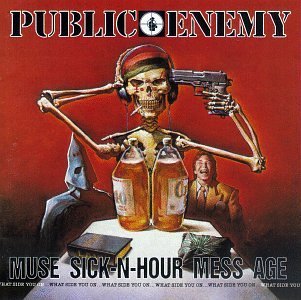
Released to mixed reviews, Public Enemy's fifth album is well overdue a re-appraisal, considering its mature De La Soul-influenced funk vibe and lyrical wisdom. When it emerged in 1994, Muse Sick... was derided as out of touch, largely for daring to question how the shortcomings of gangsta rap’s preoccupation with guns, drive-bys, 40oz beers and blunts reflected on the African-American community. Having done so much to revolutionise hip-hop, PE were now asking where the genre was heading and whether it had lost its way. With hindsight, these were all all valid questions.
Muse Sick... opens with the sampledelic, scene-setting explosion of Whole Lotta Love Goin On In The Middle of Hell, holding a mirror up to still burning contemporary issues, most notably with Flav mocking Rodney King’s “Can’t we all just get along?” media soundbite. Sustaining the pressure, the laid-back Cypress Hill-style vibe of lead single Give it Up is contrasted by Chuck’s bullish delivery as he spits, “I never did represent doing dumb shit/Some gangsta lying – I'd rather diss Presidents”. PE's fearless frontman is even more bluntly confrontational on So Whatcha Gone Do Now?, asking “What good is the hood if you’re acting a fool?”, his frustrations echoing in the track's “rap-guns-drugs’n’money” backing vocal.
Quite prophetically, having pegged the nihilism of gangsta rap as a passing fad, Chuck stated, “We’re making a record for 1999, not ’94” on the sleeve liner notes. He even predicted the poor reviews the album would garner in hidden CD track Ferocious Soul. PE would indeed outlive gangsta rap, but following the release of Muse Sick, they would go on hiatus until their re-emergence in 1998 with the He Got Game soundtrack album.
4. Apocalypse 91... The Enemy Strikes Black (1991)
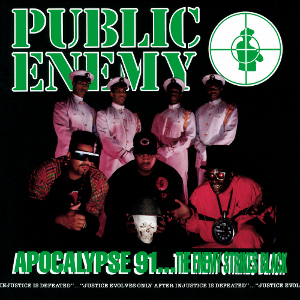
The early '90s were an ugly time for racism, not least with the notorious incidence of LAPD brutality on Rodney King. The subsequent six days of riots which followed the acquittal of his attackers were only quelled when the National Guard was sent in.
Across America, tensions were inflamed, but hip-hop's most provocative unit were never going to call for calm: instead, Apocalypse 91... The Enemy Strikes Black emerged as their heaviest, most hardcore and militant release to date.
The heavy funk of Can’t Truss It compares existing racist tropes and discrimination of the black working class to slave era America. Chuck contextualises the analogy with the rhyme, “Do you understand/That’s why it’s hard/For the black to love the land”. The appropriately ominous protest anthem By the Time I Get To Arizona took issue with the state’s then refusal to commemorate Martin Luther King Jr. Day as a public holiday (notoriously right-wing state governor Evan Mecham, declared "King doesn't deserve a holiday," and later told black community leaders, "You folks don't need another holiday. What you folks need are jobs.")
The original version of slow-burning cut Shut ’Em Down sees Chuck questioning corporate investment in relation to black community sales with the classic rhyme, “I like Nike, but wait a minute/The neighbourhood supports so put some money in it.”
Not everything was so thoughtfully considered, regrettably: as with Chuck’s Meet the G That Killed Me from Fear of a Black Planet, Flav’s problematic rhymes on A Letter to the New York Post furthered accusations of homophobia against the group, a charge previously levelled at Griff following a controversial press interview prior to the release of 1988's ...Nation of Millions.
Buy from Amazon
3. Yo! Bum Rush The Show (1987)
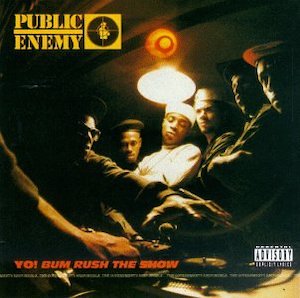
Yo! Bum Rush the Show arrived in early 1987 with a fearsome maelstrom of engulfing beats, sounds and samples, the likes of which had never been heard. Nothing before or after came close to it as a hip-hop debut, except possibly NWA’s Straight Outta Compton, which dropped after PE had already taken ownership of 1988 with ...Nation of Millions.
Immediately gripping, opener You’re Gonna Get Yours namechecks the 98 Posse – a set of Long Island thugs so named by Chuck because they all drove 98 Oldsmobiles. Featured on the sleeve of the single, they became unofficial PE minders by lending muscle to early performances. Miuzi Weighs a Ton with its neighbourhood-upsetting shuddering bass and furious rap flow, pointed the way ahead for the group’s developing progressive socio-political manifesto. By the time Nation of Millions surfaced, it was evident that lyrical foolishness like Sophisticated Bitch had been consigned to the dustbin of history.
Public Enemy #1 was the first ever PE track, recorded in demo form years earlier when Chuck D’s outfit was still known as Spectrum City. It samples Blow Your Head, a 1974 funk cut by The JBs that Chuck became obsessed with after hearing in heavy rotation at his local roller-skating rink. Upon hearing said demo, Def Jam Recordings co-founder Rick Rubin was insistent PE should be signed to his label with a quickness: hip-hop would never be the same.
2. Fear Of A Black Planet (1990)
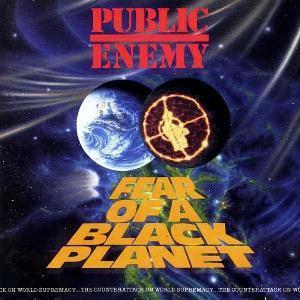
Doubling down on black nationalism and criticism of institutional racism, PE’s third album was enormously ambitious in scope, with an even denser production than its predecessor.
Epitomising the album’s unapologetic and unrepentant tone, signature track Welcome to the Terrordome addresses conspiracy and political intrigue in relation to black history, as well as PE’s own recent controversies. Ice Cube (who used The Bomb Squad for his post-NWA debut solo album of the same year, AmeriKKKa’s Most Wanted) and Big Daddy Kane guest on Burn Hollywood Burn, a demolition of the film industry and its stereotypical portrayal of blacks, but Flavor Flav is the real star of Fear of a Black Planet, delivering the truly danceable badass rap-funk of Can’t Do Nuttin’ for Ya Man, a typically comical cut only accentuating the seriousness of 911 Is a Joke, a satirical swipe of paramedic response times to medical emergencies in black neighbourhoods.
Following their crossover into the mainstream thanks to the success of single Fight the Power (the theme to Spike Lee’s 1989 movie Do the Right Thing), Fear of a Black Planet was an album which promised to propel PE into the stratosphere, but the period was dogged by controversy, with Chuck D announcing Professor’s Griff dismissal from the group for well-documented anti-Semitic remarks ahead of the album release.
Buy from Amazon
1. It Takes A Nation Of Millions To Hold Us Back (1988)

Chuck D describes It Takes A Nation of Millions To Hold Us Back as rap’s Sgt. Pepper’s Lonely Hearts Club Band, suggesting that like the Beatles’ eighth studio album, Public Enemy's second album was utterly ground-breaking, and ushered in a new genre of music. He's not wrong.
PE's breakthrough single Rebel Without A Pause landed with an incendiary impact almost a year ahead of the album's release. Barely 12 months on from the release of the biggest hip-hop single so far – Run-DMC’s MTV-pleasing cover of Aerosmith’s Walk This Way – it sounded completely alien, fierce and futuristic.
Any fears that it would be a hard act to follow were detonated by four further singles from the album, each astonishing in its own way: Bring the Noise, Don’t Believe the Hype, Night of the Living Baseheads, and Black Steel in the Hour of Chaos.
The latter, with its typically poetic Chuck D song title, is a fictionalised account of how Chuck D is imprisoned for refusing the draft, concluding with a jailbreak organised by the S1Ws. Black Steel... conveys fortitude in the face of oppression, and the track found a sizeable crossover audience, with covers performed by Sepultura and Tricky. It’s a personal song for Chuck D who was once told by his mother, “Whatever you do, don’t go to war for this country. Be a conscientious objector.” As a child, he watched his two uncles served with draft papers when they were just 18. One never returned from war.
The Bomb Squad’s attention to detail throughout the album is staggering: Night of the Living Baseheads alone uses 20 different samples, including a sample of Chuck D himself spitting “Bass!” from Bring the Noise. Most impressively, samples are even cut into the lyrical flow as rhymes, such as “Stop illin’ and killin’, stop grillin’, yo, black, yo/We are willing” (Boogie Boys’ Rappin’ Ain’t No Thing) and “I see it on their faces/First come, first serve basis” (Run-DMC’s Sucker MCs).
A hotbed of creativity, rap was moving fast in the late '80s and the explosion of ...Nation of Millions accelerated its evolution. A classic, faultless, peerless album.
